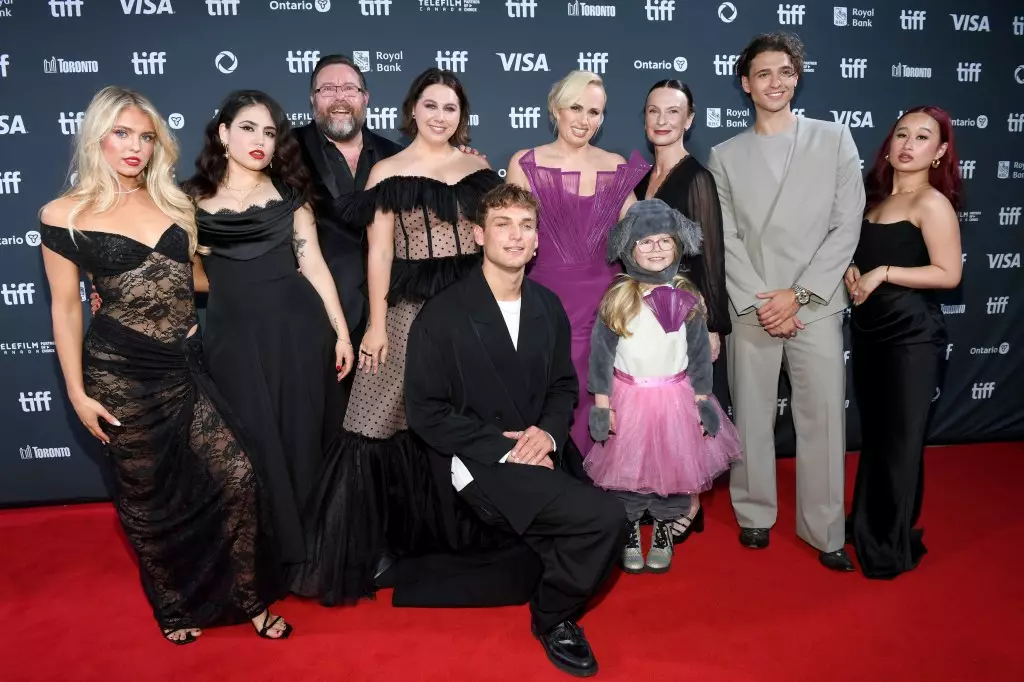In a world where the entertainment industry often hides misconduct behind a curtain of glamour, Rebel Wilson’s recent legal actions have put a spotlight on the often murky dynamics at play. The actress and director has made headlines for her counter-complaint against the producers of her film “The Deb,” which premiered at the Toronto Film Festival. This move is not merely a response to a lawsuit filed against her; it represents a significant stand against alleged abuses within the film industry, particularly regarding bullying, intimidation, and other inappropriate behaviors. By taking legal action, Wilson hopes to not only assert her rights but also to amplify the voices of those who have suffered in silence.
The circumstances that led to this clash are both complex and revealing, suggesting that Wilson’s decision to sue is rooted in a broader context of systemic issues within Hollywood. Her recent counter-complaint filed in Los Angeles asserts that her co-producers, Amanda Ghost, Gregor Cameron, and Vince Holden, engaged in actions that warrant serious scrutiny. It is remarkable to see Wilson openly brandishing the legal system as a weapon against what she describes as a “troubling pattern of egregious and illicit behaviors.” Instead of shrinking away from the challenge, she has chosen to engage in a legal battle, symbolizing a potential shift in how industry figures confront misconduct.
Wilson’s lawsuit delves deeper than mere contractual disputes; it paints a picture of a toxic environment that went unchecked for too long. The details outlined in the nine-claim suit are striking: accusations of theft, bullying, and sexual misconduct are not just thrown around casually; they are battle cries reverberating through the industry. Furthermore, Wilson’s claims suggest that these three producers acted with an arrogance that disregarded their responsibilities and affected others adversely. The blatant dismissal of accountability displayed by these figures provides a tangible focal point around which conversations regarding misconduct can coalesce.
Even more critically, this situation raises the question of why such behaviors continue to persist in the film industry. Although Wilson’s case is indeed emblematic of a larger problem, it also underscores the cyclical patterns of intimidation that perpetuate silence among victims. The assertion from Wilson’s camp that the producers “resorted to the ‘Amanda Ghost strategy’ of intimidation and bullying” reveals a calculated and systemic attempt to silence dissenting voices. Such dynamics not only perpetuate a culture of fear but also serve to shield wrongdoers from facing the consequences of their actions, demonstrating how vital Wilson’s fight is—not just for herself but for everyone who faces similar challenges in their careers.
The back-and-forth feuds between parties involved reflect a broader conflict over control of narratives within the industry. Wilson’s decision to counter-sue demonstrates a refusal to be sidelined in the midst of a public relations war. Where once she might have been threatened into silence, she has instead opted to shine a light on misconduct, thus reclaiming her own story and giving support to those who may be facing similar issues. The counter-complaint not only seeks unspecified damages but serves as a clarion call to others who have experienced injustice.
Moreover, Wilson’s attorney, Bryan Freedman, has pointed out that the producers’ desperate attempts to malign her character will ultimately backfire by exposing even more of their misdeeds. His statement about the “plethora of shocking misconduct” having been witnessed by others hints at a growing willingness among victims to come forward. This could lead to revelations that might reshape the industry as we know it, fundamentally altering how such matters are treated in the future.
As Rebel Wilson embarks on this legal journey, she not only fights for her own reputation but also emboldens others who have felt powerless against the industry’s intimidation tactics. What once may have seemed like an insurmountable struggle is now a rallying point for accountability. Each legal document filed is not just a step toward resolution for one individual but potentially a giant leap toward a new standard in the entertainment industry.
This ongoing saga serves as a reminder that despite the glitz and glamour associated with Hollywood, there is a dark underbelly that often remains hidden. As people like Wilson begin to rise and confront misconduct head-on, it sparks hope that change is possible. The outcome of her lawsuit may set important precedents for future cases of industry wrongdoing, proving that the fight for justice—against all odds—is a battle worth waging.


Leave a Reply